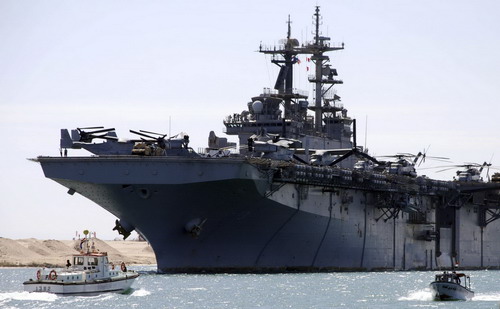U.S. warships approach Libya
 |
|
A police coastguard boat travels past US amphibious assault ship USS Kearsarge as it sails through the Suez canal in Ismailia, about 120 km (75 miles) north of Cairo, March 2, 2011. |
The United States and its Western allies are boosting their naval presence near unrest-stricken Libya, albeit audible caution and opposition against military intervention.
U.S. and NATO naval facilities in Souda Bay of the Greek island of Crete have been put on alert, according to reports from Greek channel Nea TV and other media outlets on Wednesday.
U.S. amphibious assault ships USS Kearsarge and USS Ponce have entered the Mediterranean Sea and are due to arrive at the bay on Friday, said the reports, which could not be immediately verified.
A U.S. submarine and a U.S. torpedo destroyer are also expected in the area on Sunday, to be followed by two other U.S. warships on March 15, according to local media.
These unconfirmed reports also said that two U.S. aircraft carriers have already been present on waters south of Crete. Other news sources said that the United States had an aircraft carrier in the Red Sea, but has not revealed whether to deploy it to the Mediterranean Sea.
In addition, three U.S. transport vessels have requested permission from Greek authorities to sail to Crete to support Washington's Libya evacuation efforts, local media reported.
Meanwhile, Canada, Britain and France, among other countries, have also despatched warships to the Mediterranean Sea for the declared purposes of assisting the exodus of foreign nationals from Libya and providing humanitarian aid.
Sources in the Greek Defense Ministry said that no request has been filed for "clearly military use" of the Souda Bay facilities. But local media said that nothing can be ruled out since the U.S. military base there had supported U.S. and NATO forces in various military operations in the past.
The ongoing mobilization of military forces is widely seen as an effort to put more pressure on Libyan leader Muammar Gaddafi following the recent sanctions imposed by the UN Security Council.
The show of force also fanned heated talks on military intervention, with U.S. Secretary of State Hillary Clinton reiterating Wednesday at a Senate hearing that the United States is "taking no option off the table."
But she also cautioned that any U.S. intervention to help Gaddafi's opponents would be "controversial" not only within Libya but in the Arab world as a whole, she said.
Echoing many U.S. defense officials, the top U.S. diplomat stressed that imposing a no-fly zone would be extraordinarily complex and that the U.S. government is exercising a great deal of caution over any actions beyond humanitarian missions.
"I think we are a long way from making that decision" on military intervention, said Clinton, noting that NATO has yet to reach agreement on any military action.
French President Nicolas Sarkozy said Wednesday that military action in Libya would not be appropriate unless the UN Security Council makes such a decision.
New French Foreign Minister Alain Juppe said his country opposes any military intervention in Libya unauthorized by the Security Council, and that military option is fraught with "unproductive extremeness."
He stressed that the UN Security Council is the only institution that has the right to decide whether to resort to military action or impose a no-fly zone over Libya.
Turkey, an influential NATO member, has stressed that the alliance could only intervene when one of its members is under attack. Prime Minister Recep Tayyip Erdogan said in visit to Germany that "NATO has no business being there" and that military intervention "is unthinkable."
The 22-member Arab League has also said that it is against direct outside military intervention, but would prefer a no-fly zone over Libya in cooperation with the African Union.
In his third televised speech since Libya's anti-government protests broke out, Gaddafi on Wednesday warned the West against any militarily intervention.
An invasion by Western forces would turn the Northern African country into another Iraq or Afghanistan, and the Libyan people would never allow their own security and oil wealth to be threatened, he said.
Once Libya is plunged into complete chaos, millions of refugees would flock into Europe, he warned.
While accusing extremists of inciting peaceful protesters to riot, he said that as long as the deluded youngsters give up violence, the Libyan government and people would forgive them, but those fomenting unrest from behind the curtain would never be pardoned.
He also lashed out at the recent UN sanctions, which he said were imposed based on false media reports. He asked the UN to send a task force to Libya as soon as possible to find out what really happened.
 0
0 







Go to Forum >>0 Comments